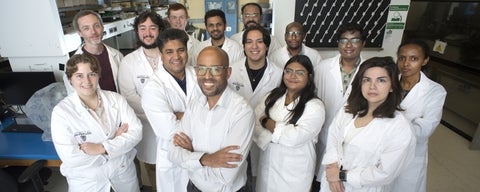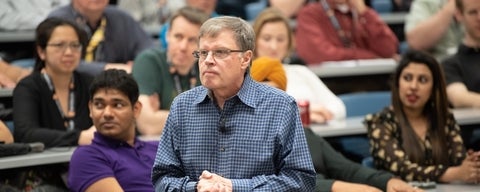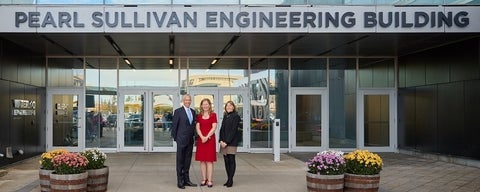Canada's Largest Engineering School
Ranked among the top 50 engineering schools worldwide, Waterloo Engineering is committed to leading engineering education and research.
We are the largest engineering school in Canada, with over 10,900 students enrolled in 2023. In 2023/24, external research funding from Canadian and international partners exceeded $79.3 million, a strong indication of our extensive industry partnerships and the excellence of our engineering research programs.
News
Alum’s startup raises $7.5M to automate crop care
Waterloo-based AgTech company Upside Robotics has secured USD $7.5 million in seed funding to accelerate the growth of its AI-powered agricultural robotics platform.
Co-founded in 2024 by Waterloo Engineering alum Sam Dugan (BASc ’22, mechatronics engineering) and Jana Tian, Upside Robotics is transforming agriculture through sustainable automation. The company’s lightweight, autonomous robots apply fertilizer precisely where crops need it, enabling farmers to remotely monitor fields, track crop health and deliver nutrients efficiently — without stepping foot on the soil.
Prof inspires graduates to become their best selves
A Waterloo Engineering professor challenged graduating students to think beyond technical success during this year’s …And One More Thing lecture, sharing her perspective on how prioritizing students’ development as good human beings empowers them to become good engineers.
Dr. Pendar Mahmoudi, an associate professor in the Department of Chemical Engineering, is the recipient of the Faculty of Engineering’s 2025 Boyce Family Teaching Award. The award was established in 2023 and made possible by generous donation from the Boyce family.
Wheeled robots respond to music to create light ‘paintings’
People can collaborate with groups of wheeled robots to create art using an interactive system developed by researchers at Waterloo Engineering.
The robots trail coloured light as they move in response to a piece of music within a fixed area – which serves as the canvas – while a camera records them to produce a “painting,” or visual representation of its emotion.
Events
2026 Capstone Symposium
Capstone Design is the culmination of the undergraduate student experience, creating a blueprint for innovation in engineering design.
Come check out this year's Capstone Design Symposium!
Wednesday, March 18, 2026 1:00 pm - 4:00 pm EDT (GMT -04:00)
Wednesday, March 18, 2026 1:00 pm - 5:00 pm EDT (GMT -04:00)2026 Capstone Symposium
Capstone Design is the culmination of the undergraduate student experience, creating a blueprint for innovation in engineering design.
Come check out this year's Capstone Design Symposium!
Thursday, March 19, 2026 12:00 pm - 4:00 pm EDT (GMT -04:00)
Thursday, March 19, 2026 12:00 pm - 4:00 pm EDT (GMT -04:00)2026 Capstone Symposium
Capstone Design is the culmination of the undergraduate student experience, creating a blueprint for innovation in engineering design.
Come check out this year's Capstone Design Symposium!






